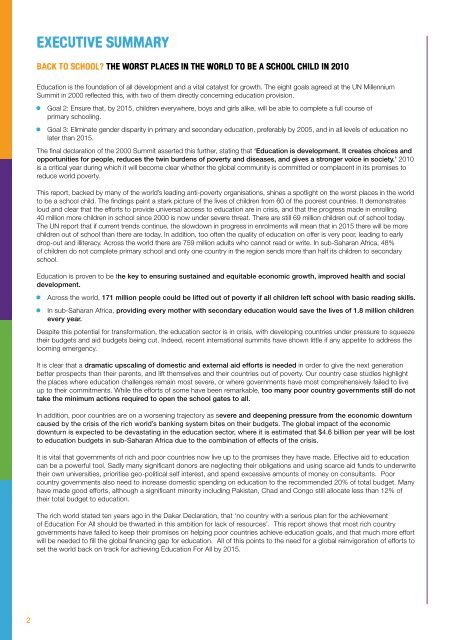BACK TO SCHOOL? - Global Campaign for Education
BACK TO SCHOOL? - Global Campaign for Education
BACK TO SCHOOL? - Global Campaign for Education
Create successful ePaper yourself
Turn your PDF publications into a flip-book with our unique Google optimized e-Paper software.
EXECUTIVE SUMMARY<br />
<strong>BACK</strong> <strong>TO</strong> <strong>SCHOOL</strong>? The worst places in the world to be a school child in 2010<br />
<strong>Education</strong> is the foundation of all development and a vital catalyst <strong>for</strong> growth. The eight goals agreed at the UN Millennium<br />
Summit in 2000 reflected this, with two of them directly concerning education provision.<br />
• Goal 2: Ensure that, by 2015, children everywhere, boys and girls alike, will be able to complete a full course of<br />
primary schooling.<br />
• Goal 3: Eliminate gender disparity in primary and secondary education, preferably by 2005, and in all levels of education no<br />
later than 2015.<br />
The final declaration of the 2000 Summit asserted this further, stating that ‘<strong>Education</strong> is development. It creates choices and<br />
opportunities <strong>for</strong> people, reduces the twin burdens of poverty and diseases, and gives a stronger voice in society.’ 2010<br />
is a critical year during which it will become clear whether the global community is committed or complacent in its promises to<br />
reduce world poverty.<br />
This report, backed by many of the world’s leading anti-poverty organisations, shines a spotlight on the worst places in the world<br />
to be a school child. The findings paint a stark picture of the lives of children from 60 of the poorest countries. It demonstrates<br />
loud and clear that the ef<strong>for</strong>ts to provide universal access to education are in crisis, and that the progress made in enrolling<br />
40 million more children in school since 2000 is now under severe threat. There are still 69 million children out of school today.<br />
The UN report that if current trends continue, the slowdown in progress in enrolments will mean that in 2015 there will be more<br />
children out of school than there are today. In addition, too often the quality of education on offer is very poor, leading to early<br />
drop-out and illiteracy. Across the world there are 759 million adults who cannot read or write. In sub-Saharan Africa, 48%<br />
of children do not complete primary school and only one country in the region sends more than half its children to secondary<br />
school.<br />
<strong>Education</strong> is proven to be the key to ensuring sustained and equitable economic growth, improved health and social<br />
development.<br />
• Across the world, 171 million people could be lifted out of poverty if all children left school with basic reading skills.<br />
• In sub-Saharan Africa, providing every mother with secondary education would save the lives of 1.8 million children<br />
every year.<br />
Despite this potential <strong>for</strong> trans<strong>for</strong>mation, the education sector is in crisis, with developing countries under pressure to squeeze<br />
their budgets and aid budgets being cut. Indeed, recent international summits have shown little if any appetite to address the<br />
looming emergency.<br />
It is clear that a dramatic upscaling of domestic and external aid ef<strong>for</strong>ts is needed in order to give the next generation<br />
better prospects than their parents, and lift themselves and their countries out of poverty. Our country case studies highlight<br />
the places where education challenges remain most severe, or where governments have most comprehensively failed to live<br />
up to their commitments. While the ef<strong>for</strong>ts of some have been remarkable, too many poor country governments still do not<br />
take the minimum actions required to open the school gates to all.<br />
In addition, poor countries are on a worsening trajectory as severe and deepening pressure from the economic downturn<br />
caused by the crisis of the rich world’s banking system bites on their budgets. The global impact of the economic<br />
downturn is expected to be devastating in the education sector, where it is estimated that $4.6 billion per year will be lost<br />
to education budgets in sub-Saharan Africa due to the combination of effects of the crisis.<br />
It is vital that governments of rich and poor countries now live up to the promises they have made. Effective aid to education<br />
can be a powerful tool. Sadly many significant donors are neglecting their obligations and using scarce aid funds to underwrite<br />
their own universities, prioritise geo-political self interest, and spend excessive amounts of money on consultants. Poor<br />
country governments also need to increase domestic spending on education to the recommended 20% of total budget. Many<br />
have made good ef<strong>for</strong>ts, although a significant minority including Pakistan, Chad and Congo still allocate less than 12% of<br />
their total budget to education.<br />
The rich world stated ten years ago in the Dakar Declaration, that ‘no country with a serious plan <strong>for</strong> the achievement<br />
of <strong>Education</strong> For All should be thwarted in this ambition <strong>for</strong> lack of resources’. This report shows that most rich country<br />
governments have failed to keep their promises on helping poor countries achieve education goals, and that much more ef<strong>for</strong>t<br />
will be needed to fill the global financing gap <strong>for</strong> education. All of this points to the need <strong>for</strong> a global reinvigoration of ef<strong>for</strong>ts to<br />
set the world back on track <strong>for</strong> achieving <strong>Education</strong> For All by 2015.<br />
2

















